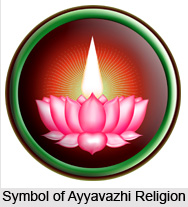 Ayyavazhi is a religious belief system that originated in the southern part of the Indian subcontinent in the mid-nineteenth century. It is regarded as a religion, which has a metaphysical and theological view that all is one and there are no fundamental divisions. According to the Indian censuses and government surveys, most of the followers of this religion consider themselves as Hindus. It is because of this reason that the religion of Ayyavazhi is also considered as a sect of Hinduism. Though this religion is found to have several characteristics which are similar to Hinduism, still the theologians, several magazines and newspapers and some academics consider it as a separate religion. Some social and religious faculties also have the same view towards the Ayyavazhi religion.
Ayyavazhi is a religious belief system that originated in the southern part of the Indian subcontinent in the mid-nineteenth century. It is regarded as a religion, which has a metaphysical and theological view that all is one and there are no fundamental divisions. According to the Indian censuses and government surveys, most of the followers of this religion consider themselves as Hindus. It is because of this reason that the religion of Ayyavazhi is also considered as a sect of Hinduism. Though this religion is found to have several characteristics which are similar to Hinduism, still the theologians, several magazines and newspapers and some academics consider it as a separate religion. Some social and religious faculties also have the same view towards the Ayyavazhi religion.
Concept of Ayyavazhi
The religion of Ayyavazhi has thousands of followers who are spread across India. The followers are highly concentrated in the state of Tamil Nadu and Kerala. The exact number of practitioners of this religion is not known but according to the censuses, it somewhere amounts to 0.7 to 8 million. In the first century since its birth, the Christian missionaries have noted the fast growth in the mid-nineteenth century. The religion of Ayyavazhi is based on the life and teachings of Ayya Vaikundar who was regarded as the Manu avatar of Trimurthi. Some of the concepts of this religion differs from that of Hinduism especially the concepts of `Good Vs Evil`, `Dharma` and a few others. Ayyavazhi initially began to be noticed in the nineteenth century as a sect of Hinduism. It also regenerates several concepts found in the religion of Hinduism. There are some who are of the consideration that the religion of Ayyavazhi is a Dharmic religion belief because of its centrality on Dharma. The ultimate aim of Ayyavazhi however lies on an ideal Dharma Yukam, which has been compared to the Abrahamic ideas of Heaven.
The followers of the religion of Ayyavazhi believes in the reincarnation and the following Dharma Yukam which is also believed to be the eighth and final yukam in which Ayya Vaikundar will reign over the world with the Santror. The Indian caste system and the standard Hindu idol worship are however condemned by them. Instead of idol worship they have adopted a non-anthropomorphic symbol as a point of devotional and meditational focus. This religious symbol better known as `Elunetru` or `Asanam` is placed in the Palliyarai and is considered as a seat of God rather than the Almighty himself. The main symbol of this much popular religion is a Lotus carrying a flame-shaped white `Namam` which can be further signified as the lotus representing the 1,008 petalled Sahasara and the Namam representing the `atma` as `soul` or `self`. To reflect that the worshipper himself is God, a mirror is installed behind this `asana`. This theory adopted by the Ayyavazhi followers is similar to that of Advaita theology. The followers of this religion even believe that the Hindu trinity Lord Brahma, Lord Vishnu and Lord Shiva are different aspects of the same god. They also recognize a Satan-like figure called `Kroni` as the primordial manifestation of evil and are manifested in various forms. The primary mission of the Ayyavazhi followers is charity and offerings of food. This can be seen in different Ayyavazhi centres of worship at least once in a month.
Teachings of Ayyavazhi
The majority of the teachings of the Ayyavazhi religion can be found in the book Akilattirattu Ammanai. Some of the teachings of Ayyavazhi proceed in two ways namely sociological and mystical. The social teachings of Ayyavazhi implemented in breaking out inequalities and discriminations in the social order while the mystical teachings are aimed at revealing supreme knowledge which is unbounded to space and time. The fearsome aspects towards the Almighty are also driven out by the teachings of this religion. Since its origin, Ayyavazhi has also taken strong strands against political oppression.
The centres of worship established by the followers of Ayyavazhi are the `Pathis` and `Nizhal Thangals` which can be observed in different parts of the country. The rituals of the Ayyavazhi religion evolved in their own way. The exclusivity of this religion lies in the fact of accepting the views of different religion for a certain span and from then onwards rejecting all of them exclusively in its narrative. To conclude, the worship of the Ayyavazhi religion is noted for its simplicity.




















